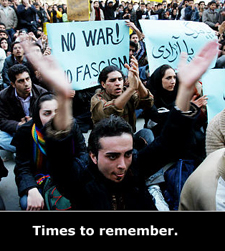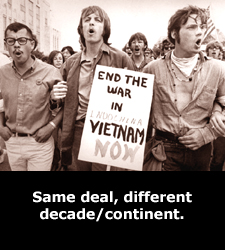I haven’t been what you might call a determined dissident over my decades as an adult. Just an occasional participant at rallies, protest marches, etc. There are very many in my  own small community who have given far more to the causes they believe in, and I respect them for it. Just as I respect pacifism, as someone who (while no fan of violence) is not a committed pacifist. It does my heart good to see those large numbers of protesters in the streets in Iran. This is a huge moment for them, one that many of the younger people among them, particularly, will never forget. Though the mainstream political and media pundits would probably disparage this connection, it’s something like the massive anti-war actions of the late 1960s and early 1970s, which of course our popular culture has shrunken down to something akin to a flower-power postage stamp. (Just as it has reduced the civil rights movement to Martin King saying “I have a dream.”)
own small community who have given far more to the causes they believe in, and I respect them for it. Just as I respect pacifism, as someone who (while no fan of violence) is not a committed pacifist. It does my heart good to see those large numbers of protesters in the streets in Iran. This is a huge moment for them, one that many of the younger people among them, particularly, will never forget. Though the mainstream political and media pundits would probably disparage this connection, it’s something like the massive anti-war actions of the late 1960s and early 1970s, which of course our popular culture has shrunken down to something akin to a flower-power postage stamp. (Just as it has reduced the civil rights movement to Martin King saying “I have a dream.”)
I know that the reason why we see so much of the Iranian movement is because of the fact that Iran is an official enemy and anything that places that government in a bad light is officially a “good thing”. That is also why very little is said about the politics of the Iranian dissidents. (Irony alert: if they had decisively won the election, they would be demonized right now for their positions on Israel/Palestine, U.S. hegemony in the Middle East, and so on.) This doesn’t take anything away from them, but it does say a lot about our political culture. Organized dissent always encounters very strong resistance in this country when it stands against deeply entrenched institutional interests like the foreign policy establishment, the military-industrial-congressional complex (Ike’s original formulation of that nexus), or major industrial groupings, such as financial services, health insurers, pharmaceutical companies, etc. Vietnam War protests, for instance, were strongly condemned from the very beginning, and really only achieved critical mass towards the end of the sixties and the early seventies.
So, what about the dissenting voices heard at town hall meetings across America this summer? Well, David Brooks seems to equate them and their various conspiracy theories  (e.g. Obama is going to force people to accept “death counseling” – be afraid!) with the anti-Iraq war movement that pegged the drive towards war largely on the influence of neoconservatives formerly associated with the Project for a New American Century, which, in fact, led the drive for war and regime change in Iraq starting in the Clinton Administration. Now, I’d say that is a little bit too fact-based to qualify as a conspiracy theory on the order of, say, Obama’s mandatory death counseling. The fact that the neoconservatives associated with PNAC were not the only ones in favor of the Iraq war doesn’t exactly absolve them of all responsibility. But the flaw in Brook’s comparison goes deeper than that. The pre-emptive movement against the War in Iraq was a massive, organic, global phenomenon that grew in the near-total absence of any articulate anti-war opinion in the mainstream media during 2001-2003. These crackhead gatherings at town hall meetings (including one in my own town led by some idiot from Rome who later went on the even more profoundly idiotic Glen Beck’s show) are not anything like a mass movement organized around a coherent goal. They’re just disparate groups of disgruntled conservatives shouting about having been out of power for six whole months.
(e.g. Obama is going to force people to accept “death counseling” – be afraid!) with the anti-Iraq war movement that pegged the drive towards war largely on the influence of neoconservatives formerly associated with the Project for a New American Century, which, in fact, led the drive for war and regime change in Iraq starting in the Clinton Administration. Now, I’d say that is a little bit too fact-based to qualify as a conspiracy theory on the order of, say, Obama’s mandatory death counseling. The fact that the neoconservatives associated with PNAC were not the only ones in favor of the Iraq war doesn’t exactly absolve them of all responsibility. But the flaw in Brook’s comparison goes deeper than that. The pre-emptive movement against the War in Iraq was a massive, organic, global phenomenon that grew in the near-total absence of any articulate anti-war opinion in the mainstream media during 2001-2003. These crackhead gatherings at town hall meetings (including one in my own town led by some idiot from Rome who later went on the even more profoundly idiotic Glen Beck’s show) are not anything like a mass movement organized around a coherent goal. They’re just disparate groups of disgruntled conservatives shouting about having been out of power for six whole months.
That said, they’ve got every right to go to these public meetings. I just think people who support the idea of universal health coverage need to attend, as well… and be vocal. And articulate. ‘Nuff said.
luv u,
jp
